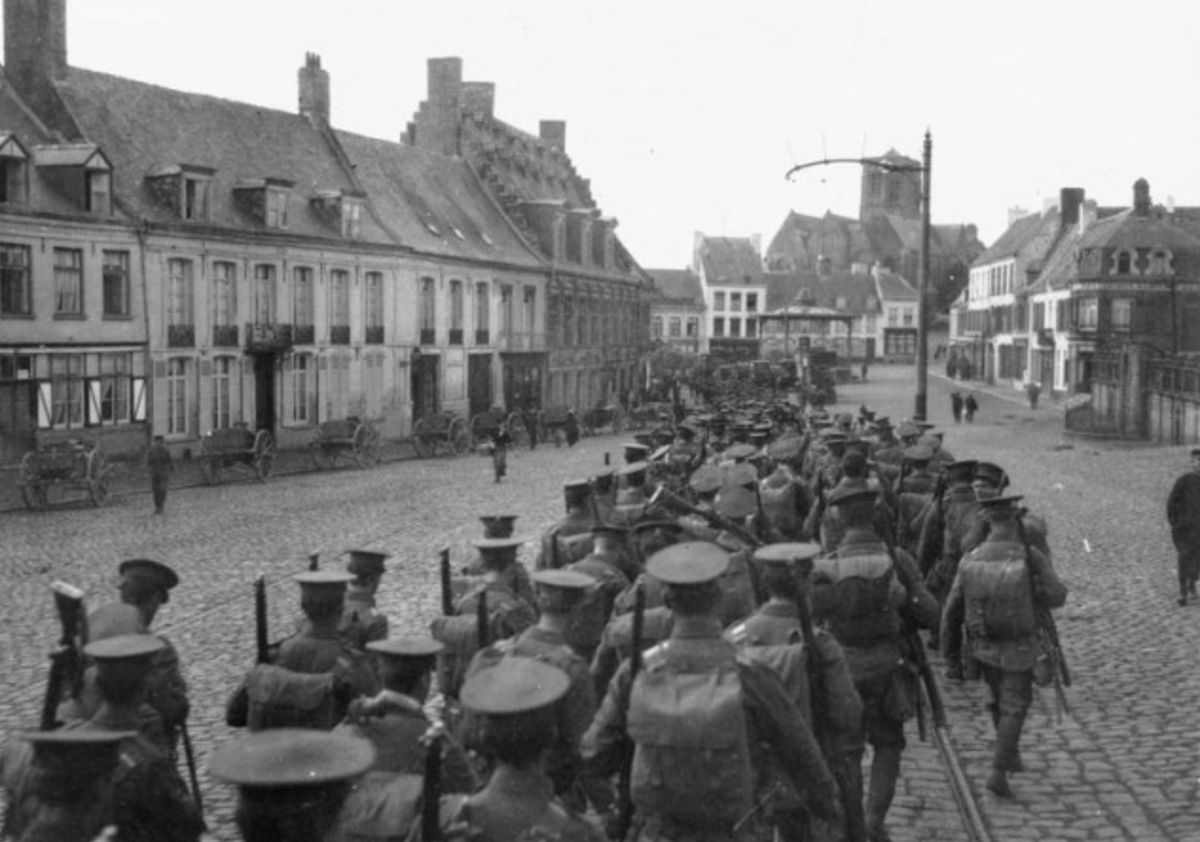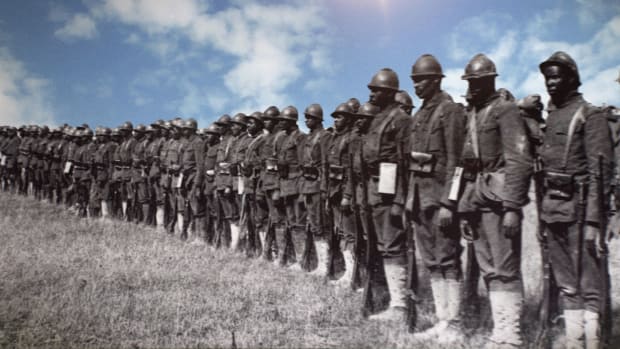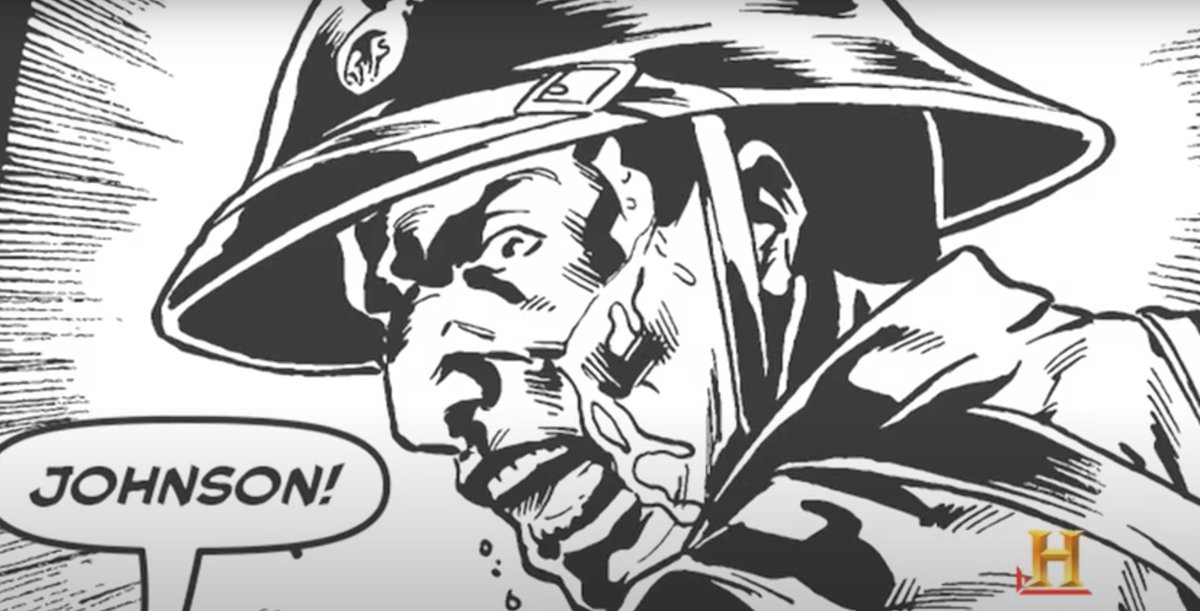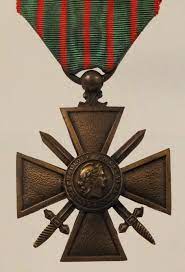
The first American solider to win the "Croix de Guerre" was Private Henry Johnson from New York in 1918.
So you ask: why did an American soldier earn a FRENCH military award during World War I?
Well, it's a story that illustrates both the best...and the worst of humankind:
👇
So you ask: why did an American soldier earn a FRENCH military award during World War I?
Well, it's a story that illustrates both the best...and the worst of humankind:
👇

It was 1917.
World War I had been going on for three years, and both the French and British armies were in desperate need of American reinforcements to continue to fight off the German Empire.
World War I had been going on for three years, and both the French and British armies were in desperate need of American reinforcements to continue to fight off the German Empire.

So on April 6th, 1917, Congress decided to enter the "Great War" and US General John J. Pershing made it clear:
American soldiers wouldn't fight in French and German uniforms as mere replacements..no.
Instead, they'd fight as an American army together, in the American uniform.
American soldiers wouldn't fight in French and German uniforms as mere replacements..no.
Instead, they'd fight as an American army together, in the American uniform.

And so here's the part in our story where we see...the worst of humankind:
Many African Americans who bravely volunteered to join the fight...were turned away.
Black Americans, many thought, wouldn't be as strong or capable on the battlefield as would white Americans.
Many African Americans who bravely volunteered to join the fight...were turned away.
Black Americans, many thought, wouldn't be as strong or capable on the battlefield as would white Americans.
But then, on May 18th, 1917, the US Government authorized the Selective Service Act which mandated all eligible Americans to enlist in the US Military.
That, of course, included African Americans.
But unfortunately, that's not to say that they weren't discriminated against.
That, of course, included African Americans.
But unfortunately, that's not to say that they weren't discriminated against.

First, African Americans volunteering for service or those drafted into the military were not allowed to serve in either the Marines OR in any of the aviation units.
Second, they were delegated to more menial support roles, like cleaning ships and building latrines.
Second, they were delegated to more menial support roles, like cleaning ships and building latrines.

The US was keeping THOUSANDS of skilled and trained African American soldiers from fighting on the front lines during a war that exhausted all of its participants' resources.
And why?
Because so many white American soldiers were unwilling to fight with their black countrymen.
And why?
Because so many white American soldiers were unwilling to fight with their black countrymen.

But the French, who needed more soldiers?
Well, they found the US policies to be ridiculous.
And so just like that, the US loaned the 4,500-man 369th Infantry Regiment to fight for the French.
Their nickname?
The Harlem Hellfighters.
And man did they fight like hell.
Well, they found the US policies to be ridiculous.
And so just like that, the US loaned the 4,500-man 369th Infantry Regiment to fight for the French.
Their nickname?
The Harlem Hellfighters.
And man did they fight like hell.

During the war, the Harlem Hellfighters spent 191 days in frontline trenches, more than any other American unit.
They also, reportedly:
•Never had a member captured
•Never lost a trench
•Never lost a foot of ground to the enemy
Hellfighters indeed.
They also, reportedly:
•Never had a member captured
•Never lost a trench
•Never lost a foot of ground to the enemy
Hellfighters indeed.

To fight like hell, the Hellfighters were given French weapons and French uniforms, as seen here.
But remember when General Pershing mentioned that all American soldiers would serve together...as Americans?
Well, apparently that only included... white Americans.
But remember when General Pershing mentioned that all American soldiers would serve together...as Americans?
Well, apparently that only included... white Americans.

So now, we get to the part of the story where we see...the best of humankind.
Meet Private Henry Johnson of Albany, New York and Private Needham Roberts of Trenton, New Jersey:
Two proud Harlem Hellfighters that fought alongside our French allies.
Meet Private Henry Johnson of Albany, New York and Private Needham Roberts of Trenton, New Jersey:
Two proud Harlem Hellfighters that fought alongside our French allies.

On May 14th, 1918, Privates Johnson and Roberts were asked to be on look-out duty ahead of the French front line, from midnight to 4AM.
To vulnerably and idly sit in "no-man's land" (that is, between the front lines of opposing sides) for four hours?
Not easy.
To vulnerably and idly sit in "no-man's land" (that is, between the front lines of opposing sides) for four hours?
Not easy.

Johnson called it "crazy."
But nonetheless, he told the French corporal he'd "tackle the job."
With Johnson and Roberts arriving at the look-out, they very soon after heard the “snippin’ and clippin’" of barbed wire, which meant only one thing:
The Germans were approaching.
But nonetheless, he told the French corporal he'd "tackle the job."
With Johnson and Roberts arriving at the look-out, they very soon after heard the “snippin’ and clippin’" of barbed wire, which meant only one thing:
The Germans were approaching.
At least 24 Germans charged the two Americans' pit while launching a fury of grenades and gunfire.
Whilst defending the look-out and the French frontline behind them, both Johnson and Roberts were carved by shrapnel and pierced by bullets.
But they kept fighting.
Whilst defending the look-out and the French frontline behind them, both Johnson and Roberts were carved by shrapnel and pierced by bullets.
But they kept fighting.

At one point, the Germans had their hands on Roberts and were taking him as prisoner.
Johnson, whose rifle jammed, was forced to fight off the enemy with a knife and his bare fists in order to keep Roberts from being taken.
And was Johnson able to?
You bet your ass he was.
Johnson, whose rifle jammed, was forced to fight off the enemy with a knife and his bare fists in order to keep Roberts from being taken.
And was Johnson able to?
You bet your ass he was.

When two soldiers tried hauling Roberts away... Johnson stabbed one in the skull.
When one soldier jumped on Johnson's back... Johnson drove his knife between the enemy's ribs.
When one soldier shot Johnson in the shoulder and thigh...Johnson slashed him away.
When one soldier jumped on Johnson's back... Johnson drove his knife between the enemy's ribs.
When one soldier shot Johnson in the shoulder and thigh...Johnson slashed him away.

Johnson, looking at death, fought with his heart:
“Each slash meant something, believe me,” he later said.
The Germans were no match for Johnson. They were forced to retreat.
And when the sun slowly came up, it was made clear:
Johnson had killed 4 Germans and wounded 20 more.
“Each slash meant something, believe me,” he later said.
The Germans were no match for Johnson. They were forced to retreat.
And when the sun slowly came up, it was made clear:
Johnson had killed 4 Germans and wounded 20 more.

With Roberts so badly injured, Johnson fought off 24 enemy soldiers from penetrating through to the front line...
BY HIMSELF.
A fine, fine hero, no?
Well, not in Johnson's eyes:
“There wasn’t anything so fine about it. Just fought for my life. A rabbit would have done that.”
BY HIMSELF.
A fine, fine hero, no?
Well, not in Johnson's eyes:
“There wasn’t anything so fine about it. Just fought for my life. A rabbit would have done that.”

For their bravery, both Private Johnson and Private Roberts were awarded France's highest military honor: the Croix de Guerre.
They were the first Americans EVER to earn the esteemed French decoration.
They were the first Americans EVER to earn the esteemed French decoration.

With the war coming to an end, Johnson and the Hellfighters returned to New York in February of 1919 to a homecoming where they were praised and celebrated.
But unfortunately, the homecoming wouldn't last long.
But unfortunately, the homecoming wouldn't last long.

In the months and years following Johnson's return, he was given no formal recognition or military award by the US Government.
One historian says definitively:
"Had he been white, he would have walked out of that war with the Medal of Honor."
But as we well know...he wasn't.
One historian says definitively:
"Had he been white, he would have walked out of that war with the Medal of Honor."
But as we well know...he wasn't.
Even worse?
With 21 severe wounds from the battle, Johnson was unable to work thereafter.
And despite his injuries, Johnson was hardly given any government support...or funding... or healthcare.
He died in 1929 from Tuberculosis.
Johnson was 36 years old.
And penniless.
With 21 severe wounds from the battle, Johnson was unable to work thereafter.
And despite his injuries, Johnson was hardly given any government support...or funding... or healthcare.
He died in 1929 from Tuberculosis.
Johnson was 36 years old.
And penniless.

67 years LATER, Johnson's first formal award came when President Clinton posthumously awarded him the Purple Heart in 1996.
Then in 2015, President Obama posthumously awarded Johnson the decoration he SHOULD have earned 98 years prior:
The Medal of Honor.
Then in 2015, President Obama posthumously awarded Johnson the decoration he SHOULD have earned 98 years prior:
The Medal of Honor.

And for Needham Roberts?
With so many debilitating injuries from the war, Roberts also had a difficult time working...and he received little to no government aid.
Roberts died by suicide in 1949.
He was 47.
With so many debilitating injuries from the war, Roberts also had a difficult time working...and he received little to no government aid.
Roberts died by suicide in 1949.
He was 47.

Roberts and Johnson?
Their stories are absolutely tragic.
May we learn from their treatment and strive to build a more equitable world.
But their stories are also inspiring.
May we be brave and heroic when all hope seems lost.
Just like a rabbit.
Just like Henry Johnson.
Their stories are absolutely tragic.
May we learn from their treatment and strive to build a more equitable world.
But their stories are also inspiring.
May we be brave and heroic when all hope seems lost.
Just like a rabbit.
Just like Henry Johnson.

Enjoy this story or learn something new today?
Follow @DavidZabinsky for more stories like this one.
Follow @DavidZabinsky for more stories like this one.
• • •
Missing some Tweet in this thread? You can try to
force a refresh





















